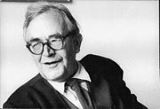
Reformed
theologian whom critics hold to be among the most important Christian thinkers of the 20th century; Pope Pius XII
described him as the most important theologian since Thomas Aquinas
. Beginning with his experience as a pastor, he rejected his training in the predominant liberal
theology typical of 19th-century European Protestantism
.
Instead he embarked on a new theological path initially called dialectical theology, due to its stress on the paradoxical nature of divine truth (e.g., God's relationship to humanity embodies both grace and judgment).
The Gospel is not a religious message to inform mankind of their divinity or to tell them how they may become divine. The Gospel proclaims a God utterly distinct from men.
![]()
The power of God can be detected neither in the world of nature nor in the souls of men. It must not be confounded with any high, exalted, force, known or knowable.
![]()
We know that God is He whom we do not know, and that our ignorance is precisely the problem and the source of our knowledge. The Epistle to the Romans is a revelation of the unknown God; God chooses to come to man, not man to God. Even after the revelation man cannot know God, for he is ever the unknown God. In manifesting himself to man he is farther away than before.
![]()
The revelation in Jesus, just because it is the revelation of the righteousness of God is at the same time the strongest conceivable veiling and unknowableness of God. In Jesus, God really becomes a mystery, makes himself known as the unknown, speaks as the eternally Silent One.
![]()
Man as man can never know God: His wishing, seeking, and striving are all in vain.
![]()
It is evident that the relation to God with which the Bible is concerned does not have its source in the purple depths of the subconscious, and cannot be identical with what the deep-sea psychical research of our day describes in the narrower or broader sense as libido fulfilment.
![]()

